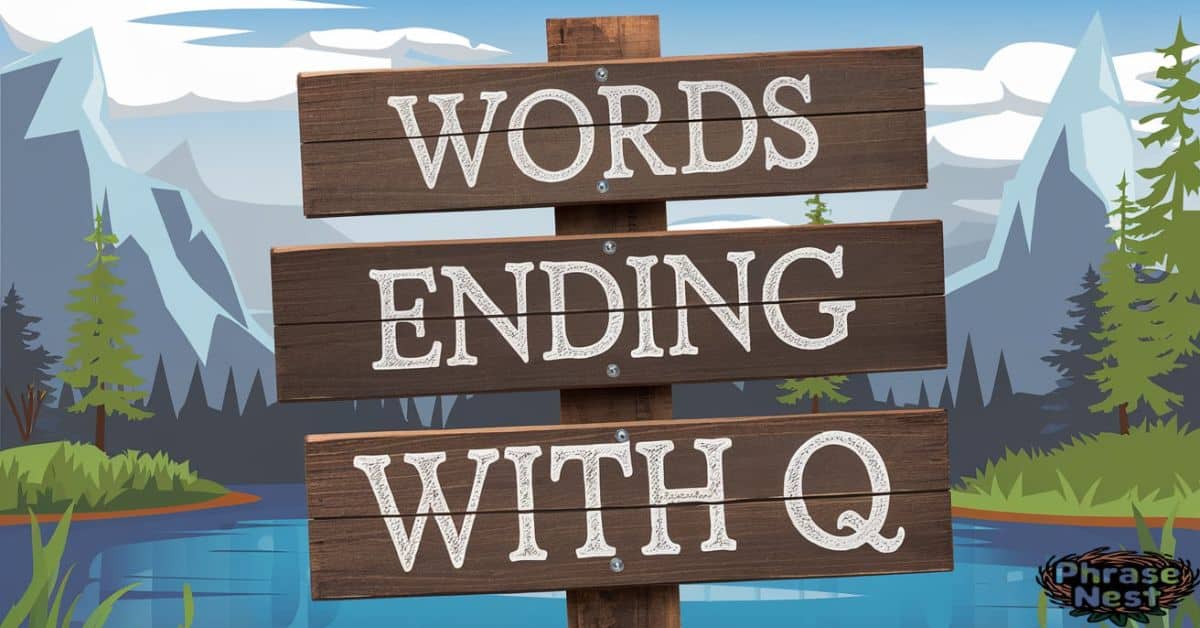Words ending with Q are some of the rarest and quirkiest finds in the English language. Have you ever wondered why they’re so uncommon or where they come from? These unusual words often have fascinating origins, borrowed from other languages or shaped by modern innovation. Whether you’re a word game enthusiast or just someone who loves uncovering linguistic oddities, this is a topic worth exploring.
Get ready to dive into a world of unique vocabulary that’s sure to surprise you! From cultural gems to tech-savvy terms, these words aren’t just fun to learn—they’ll make you the go-to trivia expert among your friends.
Why “Q” Without “U” Is So Rare
In English, the letter “Q” is almost always followed by “U.” But why? This tradition stems from Latin, where “QU” was a common pairing. However, the exceptions we’ll explore often come from languages like Arabic, Hebrew, or Inuit, where such pairings aren’t the norm, or from modern abbreviations and acronyms.
Words ending in “Q” are uncommon, but they highlight how English borrows from other languages and adapts over time. These words are often challenging to use in conversation, but they make for interesting linguistic trivia and can even give you an edge in word games.
Adjectives That End with “Q”
Adjectives ending in “Q” are especially rare. Here are a few examples, divided by their usage and origin:
Borrowed from Other Languages:
These adjectives often come from languages like Arabic or Inuit, reflecting specific cultural or environmental traits.
- Baroque: Referring to a richly detailed, extravagant style in art, music, or architecture.
- Appliqué: A decorative design sewn onto a fabric.
- Monocoque: Describing a construction technique where the external shell supports the structural load, commonly used in vehicles and aircraft.
Technical or Modern Usage:
Some adjectives are technical terms or modern derivatives.
- Oblique: Slanted or indirect in position or meaning.
- Opaque: Not transparent; hard to understand or interpret.
- Antique: Belonging to a previous era, often valuable due to its age.
Nouns That End with “Q”
Nouns ending in “Q” often have fascinating origins and meanings. Some are rooted in foreign languages, while others come from specialized fields.
Cultural and Linguistic Origins:

- Iraq: The name of a country in the Middle East, derived from Arabic.
- Qaraq: A type of traditional Arabic coffee.
- Talaq: A term in Islamic law referring to divorce.
Acronyms and Abbreviations:
- DAQ: Stands for “Data Acquisition,” used in tech and engineering.
- IRQ: Short for “Interrupt Request,” a computer hardware term.
- FAQ: Frequently Asked Questions, a common abbreviation in digital and print media.
Nature and Environment
These adjectives capture the essence of the natural world, often borrowed from other languages or rooted in descriptive imagery:
- Basaltique: Pertaining to basalt, often describing volcanic rock formations.
- Arctique: Relating to the Arctic region or extreme cold.
- Exotique: Suggesting something unusual, foreign, or tropical.
- Aquatique: Connected to water or aquatic environments.
- Écologique: Focused on environmental sustainability or ecosystems.
Art and Aesthetics
Words that reflect beauty, creativity, and style:
- Romantique: Evoking romance, passion, or idealism.
- Rustique: Describing something rural, simple, or old-fashioned in charm.
- Classique: Referring to traditional, timeless, or elegant styles.
- Chic: Stylish, fashionable, and sophisticated.
- Fantastique: Conjuring a sense of wonder, fantasy, or extraordinary qualities.
Technical and Scientific Terms

These adjectives are often used in specialized fields, showcasing how language evolves with technology and science:
- Atomique: Related to atoms or atomic energy.
- Cinéastique: Pertaining to cinema or filmmaking.
- Électronique: Associated with electronics or electronic devices.
- Mécanique: Relating to mechanics or machinery.
- Acoustique: Describing sound, hearing, or acoustics.
How to Use These Words in Everyday Life
Admittedly, many of these words might not come up in daily conversation, but they can be useful in specific contexts:
- Enhance your writing: Use adjectives like “opaque” or “oblique” to add depth to your descriptions.
- Impress in word games: Words like “baroque” or “faq” can score big points in Scrabble or crossword puzzles.
- Cultural awareness: Terms like “Iraq” or “talaq” reflect their linguistic and cultural contexts, making them valuable for understanding other cultures.
Fun Facts About Words Ending with “Q”
- Only a handful of words in the English language end with a standalone “Q” without “U.”
- Many of these words are borrowed from non-English languages, showcasing the diversity of English vocabulary.
- Some technical terms, like “DAQ” or “IRQ,” show how modern technology shapes language.
A Final Thought: Embracing the Unusual
While words ending in “Q” may seem like a small linguistic curiosity, they remind us of the richness and adaptability of language. They demonstrate how English evolves, borrows, and innovates. Whether you’re a language lover, a trivia enthusiast, or someone looking to expand your vocabulary, these words are a testament to the endless possibilities of expression.
Next time you encounter an unusual word, take a moment to appreciate its origins and meaning. After all, every word has a story—and sometimes, it ends with a “Q.”

Annie Bellish, an author at Phrasenest.com, brings clarity and precision to her articles on grammar and language. Known for her insightful, articulate, and concise writing, she simplifies intricate grammar rules and shares practical tips. Annie’s passion for language shines through her engaging content, helping readers express themselves with confidence and eloquence.

